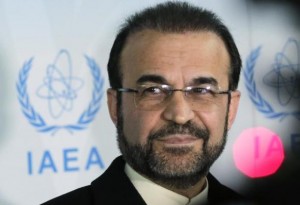 Iran's ambassador to the International Atomic Energy Agency (IAEA) Reza Najafi attends a news conference at the headquarters of the IAEA in Vienna December 11, 2013. REUTERS/Leonhard Foeger[/caption]
Iran's ambassador to the International Atomic Energy Agency (IAEA) Reza Najafi attends a news conference at the headquarters of the IAEA in Vienna December 11, 2013. REUTERS/Leonhard Foeger[/caption]Iran�s ambassador to the International Atomic Energy Agency (IAEA) says the latest report by the agency confirms the �transparency� of Iran�s nuclear program.
The detailed report of the IAEA indicates �the complete transparency�of Iran�s peaceful nuclear program,� IRNA quoted Reza Najafi as saying on Thursday after the IAEA confirmed earlier in the day that Iran has honored an interim deal it signed with the P5+1 countries in 2103.
The IAEA said in a report on Thursday that Iran has lived up to its obligations to limit certain aspects of its nuclear energy program under the interim nuclear deal it signed with the six countries�in November 2013. The report also highlighted that Iran has stopped enrichment in the IR-5 centrifuge located at the Natanz nuclear facility.

The report, however, said that Tehran has not addressed all the questions the agency has raised regarding the country�s nuclear program.
Iran and the IAEA signed a joint statement on November 11, 2013 to outline a roadmap for mutual cooperation on certain outstanding nuclear issues.
In May�2014, the two sides held a technical meeting within the Framework for Cooperation agreed in November 2013. During the meeting, they agreed to five practical measures to be implemented by August 25, 2014.
On September 15, 2014, IAEA�Director General Yukiya Amano confirmed that Iran had enforced three of the five transparency measures it had previously agreed to, and said Tehran and the IAEA had begun talks on the implementation of the two remaining measures.
Najafi said on Thursday, �With regards to the implementation of agreed practical measures, Iran has completed most of them,� adding that the Islamic Republic has done its share for making headway toward completing the two remaining practical measures by offering to the IAEA access to the�Marivan site.
"Iran is not obliged to provide further explanation", he added.
Najafi said that the report by the IAEA has been the same as previous reports and the only new point in the latest document was Amano's�meeting with�Iran�s Foreign Minister Mohammad Javad Zarif�on the sidelines of the Munich Security Conference in Germany earlier this month.

Iran has time and again emphasized its readiness for full cooperation with the IAEA.
On November 20, 2014, Najafi said Iran will on a �voluntarily basis� give the Vienna-based IAEA access to the Marivan site, located more than 700 kilometers (434 miles) west of the Iranian capital, Tehran.
On December 11, 2014, the IAEA claimed that the offer does not help address the agency's concerns pertaining to the issue of alleged high-explosive experiments at the site.
An IAEA report in 2011 claimed that it had information indicating large-scale high-explosive experiments were conducted at the site.
Najafi dismissed the allegations as �baseless and fabricated,� noting that such alleged experiments could easily be traced if the site was visited.
The latest IAEA report comes as Iran and the US are to begin a new round of nuclear talks in the Swiss city of Geneva. The negotiations�will begin on Friday, when the two country's deputy foreign ministers will hold talks on the Islamic Republic�s nuclear program, said�Iranian Deputy Foreign Minister for Legal and International Affairs Seyyed Abbas Araqchi.
The talks between the deputy foreign ministers will continue on Saturday, Araqchi said, adding, �On Sunday�and Monday, Iran�s Foreign Minister Mohammad Javad Zarif and US Secretary of State John Kerry�will join the negotiators and the talks�will continue� between the delegations from the two countries.
�It is also likely that after the fourth day [of bilateral talks between Iran and the US] the negotiations are held at the P5+1 level,� Araqchi added.
Iran and the P5+1 countries � Russia, China, France, Britain, the United States and Germany � are seeking to seal a high-profile political deal by the end of March and to confirm the full technical details of the accord by July 1.
The scale of Iran�s uranium enrichment and the timetable for the removal of anti-Iran sanctions are seen as the major stumbling blocks in the talks.
Iran has so far suspended some of its enrichment program in return for certain sanctions relief.
By Press TV










